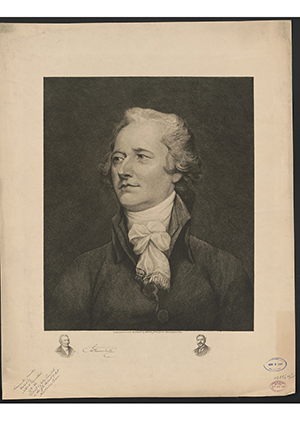
Constitution 101 Course
Start your constitutional learning journey

Alexander Hamilton | 1777

What is Representative Democracy? In 1777, while young Alexander Hamilton served in the Army of the American Revolution, Gouverneur Morris served on the New York Committee of Correspondence. New York drafted its state constitution that year, and Morris sent a copy of it to Hamilton for his comments. Hamilton returned the following letter with his views on the form of government being adopted, which was very similar to the one drafted for the United States in 1787. He argued that representative democracy removed the danger of faction intrinsic to popular government and that separation of powers founded as much as possible in direct election was the means to accomplish it.

Emeritus Dean of James Madison College and Emeritus Professor of Political Science at Michigan State University

Associate Professor of History at Stanford University
Dear Sir:
…I partly agree and partly disagree with you respecting the deficiencies of your constitution. That there is a want of vigor in the executive, I believe will be found true. To determine the qualifications proper for the chief executive Magistrate requires the deliberate wisdom of a select assembly, and cannot be safely lodged with the people at large. That instability is inherent in the nature of popular governments, I think very disputable; unstable democracy is an epithet frequently in the mouths of politicians; but I believe that from a strict examination of the matter, from the records of history, it will be found that the fluctuation of governments in which the popular principle has borne a considerable sway, has proceeded from its being compounded with other principles and from its being made to operate in an improper channel.
Compound governments, though they may be harmonious in the beginning, will introduce distinct interests; and these interests will clash, throw the state into convulsions & produce a change or dissolution. When the deliberative or judicial powers are vested fully or partly in the collective body of the people, you must expect error, confusion and instability.
But a REPRESENTATIVE DEMOCRACY, where the right of election is well secured and regulated & the exercise of the legislative, executive, and judiciary authorities is vested in select Persons chosen really and not nominally by the people, will in my opinion be most likely to be happy, regular, and durable.
That the complexity of your legislative will occasion delay and dilatoriness is evident and I fear may be attended with much greater evil; as expedition is not very material in making laws, especially when the government is well digested and matured by time.
The evil I mean is, that in time, your senate, from the very name and from the mere circumstance of its being a separate member of the legislature, will be liable to degenerate into a body purely aristocratical. And I think the danger of an abuse of power from a simple legislative would not be very great, in a government where the equality and fulness of popular representation is so wisely provided for as in [New York’s].